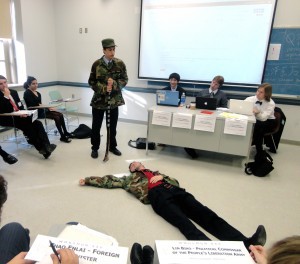Often the first time a crisis committee is explained to a MUN delegate, the headline characteristic used to describe this type of debate is the fact that delegates can be assassinated. This glorified action is often as exciting as it sounds when it occurs in committee, but there is a lot of misinformation about how assassinations occur, what they mean for the progress of committee, and what they mean for you as a delegate. Through this article I hope to provide a critical analysis of assassinations as well as how you can orchestrate one yourself in committee.
What Role do Assassinations Play in a Crisis Committee?
At its core definition, a crisis committee is an environment of constant change caused by sudden and haphazard emergencies, disasters, and assassinations. Whether its the death of a minister on a cabinet crisis or the sudden poisoning of a priest in a Crusades committee, an assassination changes the entire balance of power in a committee and shifts the topic of debate to investigating the death and reestablishing peace in the world. It is important to note this effect because a Chair or Crisis Director will be making the decision on whether the assassination will occur or not, and often they will utilize it if committee has stagnated and debate needs to become more exciting and fun. On the delegate side, when a certain member of your committee begins to dominate the crises, committee directives, both moderated and unmoderated causes, and has only gained more power through their secret personal directives, then an assassination is bound to occur to establish a renewed level of equality among committee delegates.
How do Committee Assassinations Occur?
The main outlet for orchestrating an assassination in your crisis committee will be through personal directives. Personal directives are informal declarations of the actions you are taking behind the scenes in your committee, granted the position you have has the capability to commit the action you are undertaking. The specifics of the assassination is up to your discretion, however it is a known fact that a Crisis Director is more likely to approve your assassination if it is well planned out and incredibly detailed. Moreover, it is important that you choose the correct delegate to assassinate and be sure to explain to your Crisis Director in the personal directive why you are trying to assassinate this delegate otherwise they might not comprehend the plan you have on how this action will both be in your character’s self interest and how it will bring you more power.
A well explained assassination plot can also bring you benefits, either by planning it so that you are the person to absorb the position of the delegate you are assassinating (think a country’s Vice President taking out the President) or by framing another delegate in the room as the killer to take down two delegates in the room by jailing the other delegate you frame for the murder.
However, it is important to know when and if it is appropriate to assassinate someone in a crisis committee. Assassinating a delegate because you personally do not like them will not earn you any respect in the eyes of the chair or the crisis staff because your actions should always have meaning and be in the interest of your character. Moreover, just writing a directive to take out someone simply because you are bored in committee is also counterproductive to the room and will most likely be rejected by the crisis staff. Instead you could bring a new idea into debate in a stagnating moderated caucus, or begin a new crisis plot, or try and pass a committee wide directive on a topic from the background guide that’s been ignored by the room.
What Does this Mean for You?
At first being assassinated sounds like you are failing committee as you couldn’t even keep your character alive, but as delegates reach veteran experience level in crisis committees they often strive to be assassinated and it becomes a normal expectation for committee. If you are assassinated, it is usually a sign that you are doing very well in committee as it signifies that other delegates firstly know who you are and care enough about you to attempt to remove you from committee, secondly it means you are so influential that members of your committee hoped to get rid of you to decrease your power, and thirdly it signifies that the crisis staff agreed with them and now have their attention on you. This last point is why being assassinated can be the best thing to happen to you in committee: it brings attention to you. The most important next step for you once you are assassinated is to capitalize on the attention. The best way to reverse the effects of an assassination (in reference to delegates attempting to curb your power and influence in committee) is to now make the committee talk about your death for another 30 minutes, force a committee wide directives led by your new character to punish those responsible in support of peace within the committee, and just voice your exaggerated outrage at the situation. Also, when you are brought back as a new character you might even start with a better position that you originally had, or now might be able to work with people who were previously your enemies, allowing you to be the person to shape the new distribution of power in committee. Thus, if you treat an assassination as a tool to both weaken opponents and bring the attention of committee back to you, you are well on your way to becoming a Best Delegate.



